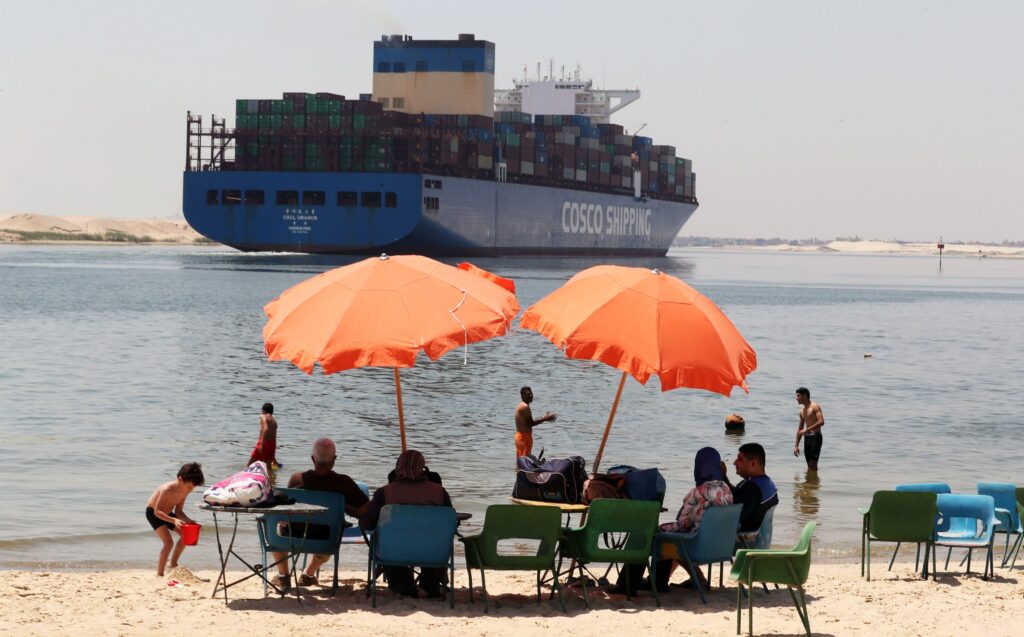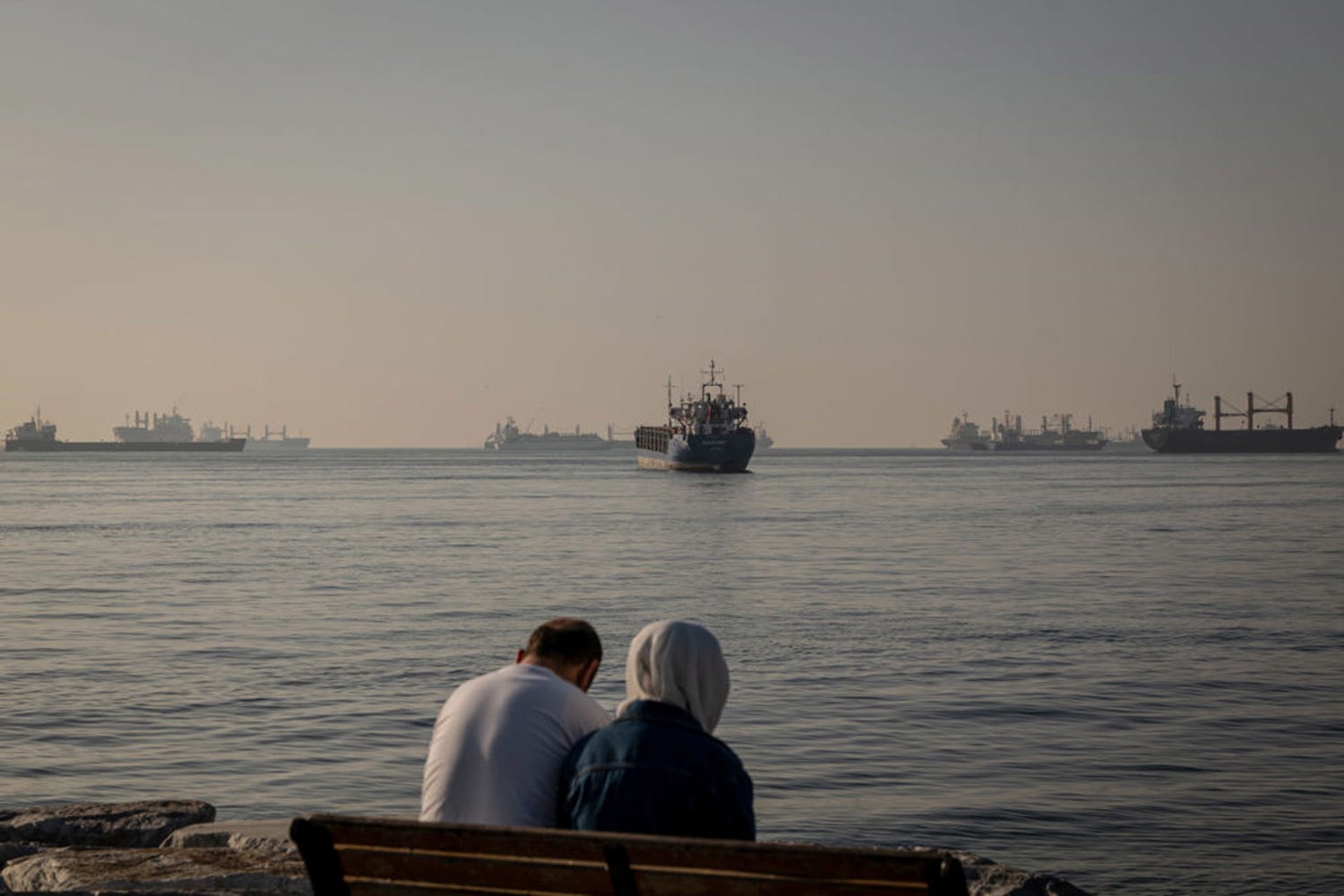Isabella Weber has catapulted to the commanding heights of the heterodox economics world. With equal amounts of panache and perspicacity, Weber’s analysis has changed how we think about strategic price controls and inflation. In this Ideas Letter essay, she updates and deepens Naomi Klein’s concept of disaster capitalism and shifts the lens from the firm to the industry, in this case shipping. Can capitalism with a human face be confected without heeding Weber’s counsel?
Catharine Stimpson, a legend in American arts and letters, has over a storied career worked prodigiously to establish Women’s Studies as an exemplary field in US higher education. Here she looks back at her life refracted through America’s, and works to understand how we can be patriotic, critical, and decent. Carly Simon once sang that “Nobody Does it Better”; I have often felt the same about Kate’s intellectual contributions.
In our curated content this week we lead with a piece from our good friends at Aeon on epistemology, showcasing a novel way to inquire how we know what we know. We follow with a revisiting and perhaps reigniting of what had once been all the rage in the world of political economy: dependency theory. We then move to a sharp critique of a world we at The Ideas Letter inhabit: the philanthropic-industrial complex. How much can we pin the blame on Gates for what’s gone sour? We conclude with an arresting interview with Bedour Alagraa and her concept of “interminable catastrophe,” here as it relates to the savage politics of Sudan.
Our musical selection for Issue 22 of The Ideas Letter comes from the guitar virtuoso Marc Ribot and his turn of the twenty-first century collective, Los Cubanos Postizos. Here he is both plaintive and powerful playing his composition Aurora en Pekin.
—Leonard Benardo, senior vice president at the Open Society Foundations
Disaster Capitalism Revisited

Isabella Weber
The Ideas Letter
Essay
Real resilience in the face of global crises will require regulating corporate profits, particularly in critical sectors like shipping, where companies have profited enormously from disasters induced by war, the pandemic and climate change. Without such regulation, the profit-driven incentives of corporations undermine efforts to build resilience, as they benefit financially from crises and have little motivation to prevent future calamities.
“Policy makers should not entrust the considerable risk of economic dislocations from freight rate explosions to a handful of companies that control the systemically important shipping industry. And the same applies to all essentials for the production and circulation of goods and livelihoods. If economic “resilience” is to be more than a polite talking point, policy makers should act when prices and profits in essentials explode. In times of geopolitical clashes and climate disaster the price mechanism is bound to fail. Water is not flowing back into the drought-ridden Panama canal in response to price signals. Wars don’t stop because freight rates shoot up.”
It Is Not America Without Dissent

Catharine Stimpson
The Ideas Letter
Essay
Stimpson reflects on her evolving views on patriotism, from idealism growing up in post-war America, to a more complex understanding shaped by experience: coming of age in the 60s, and working in academia as “it was increasingly possible to design change” that could be transmuted into institutional norms and law. In the digital age, she emphasizes the dangers of disinformation and the need for vigilance against such threats. The university is a site of learning vital to safeguard democracy.
“I am not only a patriot about my country, no matter how skeptically and stubbornly, but an advocate for education in general and colleges and universities in particular. Indeed, my patriotism and advocacy are looped and intertwined in a big circle in my John Deweyite soul. A mind-full, care-full education, in all the disciplines, does prepare students for democracy. It hones critical thinking and shaves off the roughness of philistinism and parochialism. The good classroom blends availability of reliable information, training in the ability to spot disinformation, and encouragement of independent thinking and discoveries. An unexamined patriotism is one of the features of an unexamined life.
Frameworks
Céline Henne
Aeon
Essay
There are two ways of structure a search for knowledge. The first is “framed enquiries,” in which settled frameworks constrain the process from question to answer, from problem to solution. The second could be termed “framing enquiries,” in which our very intellectual frameworks are challenged. Some knowledge is about discovering fixed truths, other knowledge is created through a dynamic process of defining and understanding concepts, influenced by human needs and interests.
“Many debates labour in unproductive arguments when it is wrongly assumed that participants share the same framework. In most social and political disagreements, the frameworks through which we analyse things and evaluate decisions—our conception of justice, equality, efficiency—are almost always at stake. If you are debating whether this or that country is a democracy, or whether trans women are women, chances are you are not relying on the same framework but rather debating about the framework itself. … But settling on a shared framework is the hard part. This is one of the reasons (although arguably, only one of many) why facts do not change minds because, most often, it is the framework through which we analyse them that is at stake. … It is, then, crucial to know when we are in a framed or in a framing enquiry, debate or conversation. The issue is not merely one of potential miscommunication, but also of misdirected argumentation.”
Do Rich Countries Keep Poor Countries Poor?
Ingrid Kvangraven
Unlearning Economics Live
Video
Dependency theory argues that poorer countries are trapped in their condition by their richer counterparts. Dependence can happen through a variety of means, such as trade relations, finance, and defense. Crucially for countries seeking to emulate their richer counterparts, this means that simple market capitalism won’t develop underdeveloped nations. Historical processes, such as colonialism and the exploitative development of capitalism, have entrenched structural disparities between the global North and South. Kvangraven highlights that only a few countries have managed to transition to industrialized economies, leaving a majority still categorized as part of the “global South.”
Dependency theorists “take a very historical approach to understanding capitalist development so this is like a part of the development of underdevelopment that I mentioned earlier um where they see how capitalism evolved in this uneven way and they could they try to understand capitalism in the periphery which is what they call Global South, in connection with how it evolved in the global North and they’re seeing this as part of the same system. They focus on the specific constraints that this leads to for the periphery like the kind of balance payments constraint that I mentioned earlier how they’re impacted by having to borrow in the in the US dollar and technological dependence and things like that there’s a range of constraints that come from being in the periphery that they try to identify. They see capitalism as inherently polarizing or uneven like generating this unevenness which is in stark contrast to more mainstream understanding of seeing it as one country developed and then others just catch up …”
Philanthropy’s Power Brokers
John Miles Branch
Public Books
Book review
The Gates Foundation wields significant power in shaping global health and education policies through its philanthropic efforts, but this influence raises concerns about transparency and accountability. It is important to reckon with how such concentrated wealth impacts democratic processes and public interests. Two books, by Amy Schiller and Tim Schwab, explore different aspects of this concern.
“Schiller’s and Schwab’s books offer some of the clearest accounts of the Gates Foundation’s power and influence on the global scene. The picture we are left with is one that reinforces many existing critiques of elite philanthropy as an antidemocratic force, if one made unique by its enormous size and the inevitable idiosyncrasies of a foundation directed so extensively by one couple. Whether directly or indirectly, Gates makes decisions affecting millions of lives from the top town, with little transparency or accountability. While some of these decisions can result in apparent solutions to urgent problems of global inequality, the foundation’s reliance upon a fundamentally extractive, neocolonial, and antidemocratic system of private market capitalism renders their mission to “help all people lead healthy, productive lives” limited from the jump. … In the final accounting, then, the distinction between Bill Gates as “philanthropist” versus Bill Gates as “power broker” may be beside the point.”
On Sudan and the Interminable Catastrophe
A Conversation with Bedour Alagraa
J. Khadijah Abdurahman
Logic(s)
Interview
Political theorist Bedour Alagraa traces her family’s migration from Sudan into the diaspora, the relationship between the Ottoman slave trade and the production of race. She applies her theory of interminable catastrophe can apply to ongoing violence within Sudan, where certain types of state and internal violence repeat cyclically.
“In terms of genres of the human, I think Sudan has a lot to tell the world about our assumptions about Man; because it’s a country that doesn’t have very many white people at all. It doesn’t even have the American dollar, because of sanctions. It doesn’t have a lot of the mainstays and the staples of what we would call Homo economicus, or Man 2’s overrepresentation as the human. And yet, they have their own genre of Man that is overrepresented that context—Man as Muslim, landholding, literate, and has a desire for war and battle. This is not what most Sudanese people would call the terms of their own humanness, but it is the version of Man that is masquerading as the whole! And so the question becomes, if it’s the case that Man’s overrepresentation is due to this idea of Man as breadwinning, as rational, as what have you, then what version of Man is overrepresented in the context of Sudan? If it is not that same kind or genre, what genre is being overrepresented? How to delink from that would be a good question.”
